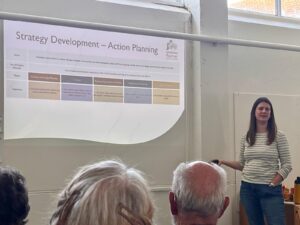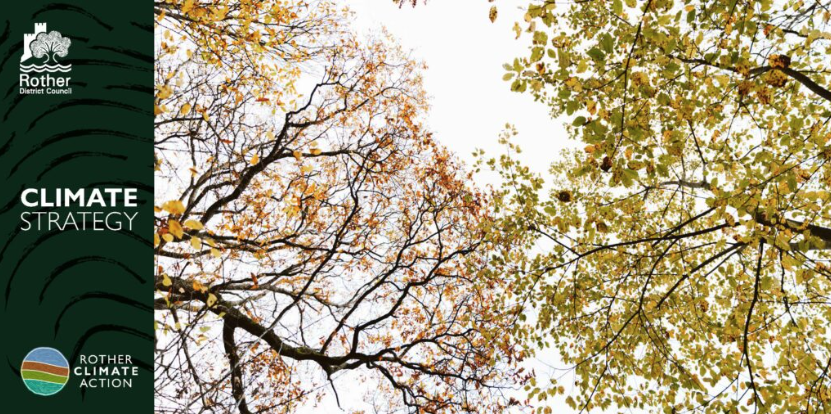The latest on the local council’s plans to combat climate change were discussed at a meeting of Rye’s Sustainable Living Forum on Saturday April 13. Rother District Council declared a climate emergency in 2019 but what is the climate change strategy? After two years of meetings that directly relate to climate change, the speaker at forum at the Tilling Green Community Centre had all the answers. Lucie Bolton is the climate strategy officer responsible for leading the Council’s plans and she has just completed an update. You can read it HERE.
Saturday afternoon was just one of a series of presentations that Lucie has given to groups in the district —including Rye Chamber of Commerce— describing the actions included in the plan that has now been fully adopted. It sets out how the Council will use its powers and influence to make the district more climate-resilient—and reduce emissions to net zero—by 2030.

Lucie explained that the climate strategy focuses on actions in five key areas: buildings and energy efficiency; transport; resource consumption and waste; biodiversity and land use; and energy generation. The updated plan began by researching emission levels generated by the District Council and the district as a whole. One disturbing pie chart showed that around two thirds of the Council’s carbon emissions are created by our waste collection vehicles. In 2026, residential food waste collections will begin and the fleet will expand; however, the impact will be greatly reduced because half the vehicles will run on green hydrogen. The strategy also encourages wider community action which, in the case of dealing with our waste, could mean much more community composting using organic waste locally instead of transporting it long distances.
There were two dozen participants in attendance on Saturday and many represented various local environmental and community groups. Also in attendance were Council members Simon McGurk, Cheryl Creaser, and Sarah Learoyd Smith. Questions led to lively discussion of some deep issues and whether or not this plan is fully implemented will depend upon a lot of people, as Lucie showed required actions are spread across many departments. These agencies provide all our local services, so they have many priorities competing with climate resilience. It appears that our chances of meeting the net zero goal could depend upon the extent to which the wider community holds our leaders accountable by standing up and speaking out. An enormous challenge.
The forum greatly appreciated Lucie’s lively and relaxed, but very passionate, presentation. Her talk showed her expertise in her field having spent five years working for Kent Wildlife Trust.
Image Credits: Rother Climate Action , Graham Ellis .




Graham Ellis’s article speaks of Rother’s ‘ plans to combat climate change.’ Such plans require challenging. Climate change is real, a natural process which has been going on 4.5bn years. Humans cannot prevent climate change, so we best use our efforts to adapt to the climate as it changes.
Councils elsewhere are being challenged as to ‘why’ they have declared a climate emergency, and ‘who’ asked them to do so.
What is clear, these plans will cost the ratepayers of Rother. As I have written here before, no academic paper exists anywhere, which proves anthropogenic C02 is causing global warming.
Hi Richard. This is the Royal Society’s take on it. Hopefully as an engineer you accept their findings: https://royalsociety.org/news-resources/projects/climate-change-evidence-causes/basics-of-climate-change/
On the question of buildings and energy efficiency could the planning laws regarding upvc windows not be relaxed slightly, I live in the conservation area but not in the “citadel” as its now trendy to call it.
My windows are far from energy efficient and I’m keen to replace them with upvc frames that comply in style and colour to the originals.
Interestingly there are building both in the conservation area and the citadel with upvc windows so how does that work?
Thanks, Nick. There are hundreds, if not thousands, of scientific papers which cite empirical evidence of human-induced climate change and support the assertion. The overwhelming majority of the global scientific community agrees that man’s activities have increased the level of carbon dioxide and other greenhouse gases, which lead to environmental warming. One only has to look at droughts, catastrophic flooding, wildfires, stronger hurricanes and other impacts to witness the effects of global heating. Yes, the climate has changed naturally over millions of years, but what we’re now experiencing is humanity shifting the dial. As such, we have the ability to reduce our emissions if the political will is there. The alternative is pretty frightening.
Line 1 of the IPCC latest synthesis report (AR6) makes it fairly clear. This from the science…
A.1 Human activities, principally through emissions of greenhouse gases, have unequivocally
caused global warming, with global surface temperature reaching 1.1°C above 1850-1900
in 2011-2020. Global greenhouse gas emissions have continued to increase, with unequal
historical and ongoing contributions arising from unsustainable energy use, land use and
land-use change, lifestyles and patterns of consumption and production across regions,
between and within countries, and among individuals (high confidence).
The science is never settled except for the Government-funded. Since 1850? After the mini ice-ages of the 19th C and for three decades following WWll? No mention of the highest recorded temperatures early in the 20th C and in 1930s (let alone the Medieval Warming). Happy to read informed comments of the technically qualified here.
If the many scientists that inform the IPCC aren’t ’technically qualified’ we really do have issues.
Here is a list of nearly 200 scientific organisations that agree with the EVIDENCE that climate change is caused by human activities. NB Science is evidence based. https://science.nasa.gov/climate-change/scientific-consensus/